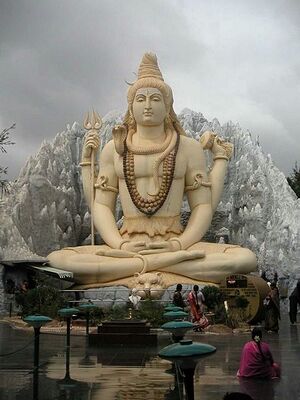Shiva Stotra

Shiva Stotra (शिव स्तोत्र) or Shiva sahasranama (शिव सहस्रनाम) is a list (sahasranama) of a thousand names of Shiva, one of the most important deities in Hinduism.
In Hindu tradition
In Hindu tradition a sahasranama is a type of devotional hymn (Sanskrit: stotra) listing many names of a deity. The names provide an exhaustive catalog of the attributes, functions, and major mythology associated with the figure being praised.
Versions of the Shiva sahasranama
There are at least eight different versions of the Shiva sahasranama. The version appearing in Book 13 (Anuśāsanaparvan) of the Mahabharata is considered the kernel of this tradition. The eight versions analyzed by Ram Karan Sharma are:
1. Mahabharata 13.17.30-150 (Anuśāsanaparvan Version)
2. Linga Purana (version 1, LP 1.65.54-168) is close to the Mahabharata Anushasanaparvan version.
3. Linga Purana (version 2, LP 1.98.27-159) has some passages in common with LP version 1, but also with other sources
4. Shivapurana 4.35.1-131.
5. Mahabharata (Śāntiparvan version). The critical edition of the Mahabharata does not include this version, relegating it to Appendix 28 to Śāntiparvan. It does appear in the text of the Gita Press edition as 12.284.68-180.
6. Vayu Purana (1.30.179-284) is almost the same as the Mahabharata Śāntiparvan version.
7. Brahmanda Purana (38.1.1-100) is almost the same as the Vayu Purana version.
8. Mahābhāgavata Upapurana (67.1-125) appears to be of comparatively recent origin.
In the version that occurs in book thirteen of the Mahabharata, Krishna recites the 1,008 names of Shiva to Yudhisthira. Yudhisthira had asked Bhishma the names of Shiva but Bhishma admitted his ignorance and requested him to ask Krishna. Interestingly, the thousand names of Vishnu, or Vishnu sahasranama, also occurs in the same chapter. Some overlapping of names with the Vishnu sahasranama has led Adi Shankara to conclude that Shiva and Vishnu are both identical, as two different aspects of one cosmic reality known as Brahman.
Jat in Shiva Stotra
According to Hukum Singh Panwar (Pauria)[1], It may not be out of place to mention here, as confirmed by N.S. Chaudhary[2] on the authority of Shiva-Stotra, one of the generals of Kartikeya (Skanda) carried name "Jata (जट)". It is well known fact that in the Deva-Asura war Kartikeya (Skanda) commanded the forces of the former, and it is quite plausible to believe that the warriors (later known to Panini as Ayuddhajivi ganas), led by general called Jata, became famous as Jat in history. We have also reason to believe that Panini, when used the phrase 'Jata jhata sanghate' (denoting union or federation or confederation or binding together, etc.), took his clue from the Jata general's role in fomenting unity in the warriors against Asuras. Jata general is also believed to give name Jutland.
रावण रचित शिव तांडव स्त्रोत
जटाटवीगलज्जल प्रवाहपावितस्थले गलेऽवलम्ब्य लम्बितां भुजंगतुंगमालिकाम्। डमड्डमड्डमड्डमनिनादवड्डमर्वयं चकार चंडतांडवं तनोतु नः शिवः शिवम ॥1॥
जटा कटा हसंभ्रम भ्रमन्निलिंपनिर्झरी । विलोलवी चिवल्लरी विराजमानमूर्धनि । धगद्धगद्ध गज्ज्वलल्ललाट पट्टपावके किशोरचंद्रशेखरे रतिः प्रतिक्षणं ममं ॥2॥
धरा धरेंद्र नंदिनी विलास बंधुवंधुर- स्फुरदृगंत संतति प्रमोद मानमानसे । कृपाकटा क्षधारणी निरुद्धदुर्धरापदि कवचिद्विगम्बरे मनो विनोदमेतु वस्तुनि ॥3॥
जटा भुजं गपिंगल स्फुरत्फणामणिप्रभा- कदंबकुंकुम द्रवप्रलिप्त दिग्वधूमुखे । मदांध सिंधु रस्फुरत्वगुत्तरीयमेदुरे मनो विनोदद्भुतं बिंभर्तु भूतभर्तरि ॥4॥
सहस्र लोचन प्रभृत्य शेषलेखशेखर- प्रसून धूलिधोरणी विधूसरांघ्रिपीठभूः । भुजंगराज मालया निबद्धजाटजूटकः श्रिये चिराय जायतां चकोर बंधुशेखरः ॥5॥
ललाट चत्वरज्वलद्धनंजयस्फुरिगभा- निपीतपंचसायकं निमन्निलिंपनायम् । सुधा मयुख लेखया विराजमानशेखरं महा कपालि संपदे शिरोजयालमस्तू नः ॥6॥
कराल भाल पट्टिकाधगद्धगद्धगज्ज्वल- द्धनंजया धरीकृतप्रचंडपंचसायके । धराधरेंद्र नंदिनी कुचाग्रचित्रपत्रक- प्रकल्पनैकशिल्पिनि त्रिलोचने मतिर्मम ॥7॥
नवीन मेघ मंडली निरुद्धदुर्धरस्फुर- त्कुहु निशीथिनीतमः प्रबंधबंधुकंधरः । निलिम्पनिर्झरि धरस्तनोतु कृत्ति सिंधुरः कलानिधानबंधुरः श्रियं जगंद्धुरंधरः ॥8॥
प्रफुल्ल नील पंकज प्रपंचकालिमच्छटा- विडंबि कंठकंध रारुचि प्रबंधकंधरम् स्मरच्छिदं पुरच्छिंद भवच्छिदं मखच्छिदं गजच्छिदांधकच्छिदं तमंतकच्छिदं भजे ॥9॥
अगर्वसर्वमंगला कलाकदम्बमंजरी- रसप्रवाह माधुरी विजृंभणा मधुव्रतम् । स्मरांतकं पुरातकं भावंतकं मखांतकं गजांतकांधकांतकं तमंतकांतकं भजे ॥10॥
जयत्वदभ्रविभ्रम भ्रमद्भुजंगमस्फुर- द्धगद्धगद्वि निर्गमत्कराल भाल हव्यवाट्- धिमिद्धिमिद्धिमि नन्मृदंगतुंगमंगल- ध्वनिक्रमप्रवर्तित प्रचण्ड ताण्डवः शिवः ॥11॥
दृषद्विचित्रतल्पयोर्भुजंग मौक्तिकमस्रजो- र्गरिष्ठरत्नलोष्टयोः सुहृद्विपक्षपक्षयोः । तृणारविंदचक्षुषोः प्रजामहीमहेन्द्रयोः समं प्रवर्तयन्मनः कदा सदाशिवं भजे ॥12॥
कदा निलिंपनिर्झरी निकुजकोटरे वसन् विमुक्तदुर्मतिः सदा शिरःस्थमंजलिं वहन्। विमुक्तलोललोचनो ललामभाललग्नकः शिवेति मंत्रमुच्चरन्कदा सुखी भवाम्यहम्॥13॥
निलिम्प नाथनागरी कदम्ब मौलमल्लिका- निगुम्फनिर्भक्षरन्म धूष्णिकामनोहरः । तनोतु नो मनोमुदं विनोदिनींमहनिशं परिश्रय परं पदं तदंगजत्विषां चयः ॥14॥
प्रचण्ड वाडवानल प्रभाशुभप्रचारणी महाष्टसिद्धिकामिनी जनावहूत जल्पना । विमुक्त वाम लोचनो विवाहकालिकध्वनिः शिवेति मन्त्रभूषगो जगज्जयाय जायताम् ॥15॥
इमं हि नित्यमेव मुक्तमुक्तमोत्तम स्तवं पठन्स्मरन् ब्रुवन्नरो विशुद्धमेति संततम्। हरे गुरौ सुभक्तिमाशु याति नांयथा गतिं विमोहनं हि देहना तु शंकरस्य चिंतनम ॥16॥
पूजाऽवसानसमये दशवक्रत्रगीतं यः शम्भूपूजनमिदं पठति प्रदोषे । तस्य स्थिरां रथगजेंद्रतुरंगयुक्तां लक्ष्मी सदैव सुमुखीं प्रददाति शम्भुः ॥17॥
Refrence - http://kalyanvaani.blogspot.in/2011/10/blog-post_4464.html
References
- ↑ Hukum Singh Panwar:The Jats - Their Origin, Antiquity & Migrations, Rohtak, 1993, p. 342 ISBN 81-85235-22-8
- ↑ Niranjan Singh Chaudhary, Jat Prasanottari (Hindi), Jat Hitkari Prakashan, Vrindavan, New Delhi, p. 14

